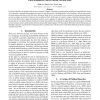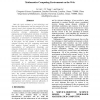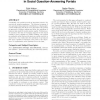42 search results - page 6 / 9 » Corroborate and learn facts from the web |
LREC
2010
13 years 8 months ago
2010
In political speeches, the audience tends to react or resonate to signals of persuasive communication, including an expected theme, a name or an expression. Automatically predicti...
SKG
2006
IEEE
14 years 21 days ago
2006
IEEE
With the rapid evolution of web technology and Internet, the mathematical web has emerged as a new research trend, which changes the traditional manner of mathematical scientific ...
CIKM
2011
Springer
12 years 6 months ago
2011
Springer
Community QA portals provide an important resource for non-factoid question-answering. The inherent noisiness of user-generated data makes the identification of high-quality cont...
WWW
2004
ACM
14 years 7 months ago
2004
ACM
Manually querying search engines in order to accumulate a large body of factual information is a tedious, error-prone process of piecemeal search. Search engines retrieve and rank...
IBPRIA
2009
Springer
13 years 11 months ago
2009
Springer
ent abstract presents OASIS, an Online Algorithm for Scalable Image Similarity learning that learns a bilinear similarity measure over sparse representations. OASIS is an online du...



